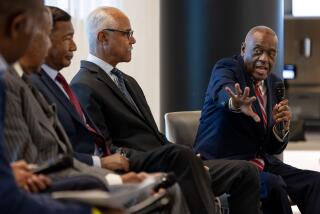War Reader Recalls the Parting Shot
- Share via
Many of us must feel, in these days of changing mores and high technology, that we were “Born Thirty Years Too Soon,” which was the title of a popular newspaper cartoon of the 1920s and early 1930s.
Now readers R. Loring of Calabasas and Kenneth S. Biely of Santa Maria have sent me a clipping from The Times that makes me feel that I was born 40 years too soon for my service in the Marine Corps in World War II.
It reports that Gen. A. M. Gray, commandant of the corps, has ordered all commissioned officers to read from three to six books a year, and for noncoms to read from two to four. Gen. Gray explains that “Marines fight better when they fight smarter.”
Specifically, Gen. Gray urges his men to read books about war--thus “War and Peace,” “All Quiet on the Western Front” and “The Red Badge of Courage” are on his list, but not Shakespeare, James Joyce or Dickens. He also recommends biographies of Patton, Eisenhower and MacArthur, and books on strategy by Mao, Thucydides and Von Clausewitz.
Such reading, the commandant believes, will provide vicarious combat experience. “You take from what you learn about battles at Gettysburg, Pusan or Tet and apply it at crucial moments.”
(Biely points out that Tet is not a place, but the North Vietnamese name for the lunar new year.)
I wish the commandant in my time had been so literary minded. When I joined the corps I had already read “War and Peace,” “All Quiet on the Western Front” and “The Red Badge of Courage.”
I question, though, that any of them prepared me for combat. “War and Peace” did deal with strategy on a grand scale, but I doubt that I was ever in a position to exploit that knowledge, being only a staff sergeant; “All Quiet” was one of the most powerful anti-war books I have ever read, and “The Red Badge of Courage,” as I remember it, was about a soldier who had to face up to his cowardice. (That might have been useful.)
I can’t help thinking that promotion might have come faster for me if our commandant had admired Marines who read. I was always lugging a book around in my fatigues--the pockets were just big enough for one of those wonderful paperbacks that were published for the armed forces.
When we left Pearl Harbor for Iwo Jima, I took half a dozen books to read on the transport. One of them, I remember, was a paperback edition of Will Durant’s “Caesar and Christ,” volume three in his “Story of Civilization.” That should have made me some points with Gen. Gray, had he been in charge.
Another of the books I took with me was “You Can’t Go Home Again” by Thomas Wolfe. On the transport we slept in tiers of bunks five high. I had wisely chosen the top bunk, to be near a light, so I could read at night. The bunk below me was occupied by an 18-year-old boy who hadn’t had much education, but who wanted to learn. He asked if I could lend him a book. I had a feeling that he had never owned one.
I lent him “You Can’t Go Home Again.” He laughed when he read the title. He made some joke about its being inappropriate (though that wasn’t his word) for a Marine about to go into battle. I agreed with him; but I’m not superstitious, and I didn’t worry about it.
He worked hard at the book. He read some of it every night, and when we reached our target he had read it almost all the way through. Of course he didn’t take it ashore. That would have been inappropriate.
I saw him on D plus 30--the day we were to embark for our return to Maui. The island had been declared secure. All of us felt lucky to be alive. We were leaving almost 7,000 dead on the island. Before we boarded the ship, my friend said he was going to make one last sortie--there were still plenty of Japanese survivors around--in search of a Samurai sword. He wanted a trophy. I told him it was foolishly dangerous, but he was determined.
I never saw him again, and I heard that he had been shot through the head.
More to Read
Sign up for our Book Club newsletter
Get the latest news, events and more from the Los Angeles Times Book Club, and help us get L.A. reading and talking.
You may occasionally receive promotional content from the Los Angeles Times.










